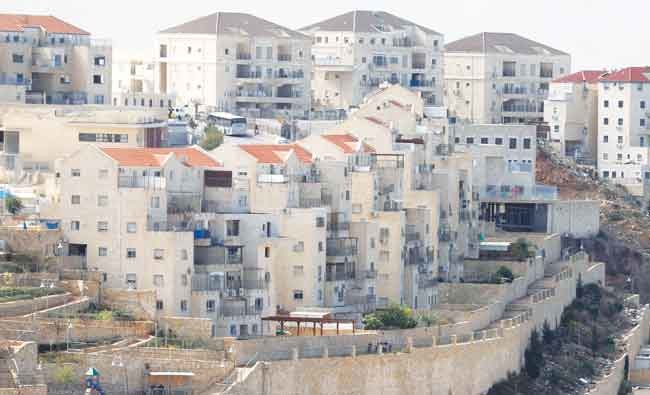AMMAN: Israel’s banks are providing services that “help support, maintain, and expand unlawful settlements” by financing their construction in the occupied West Bank, a new report has revealed.
The 41-page report, “Bankrolling Abuse: Israeli Banks in West Bank Settlements,” by Human Rights Watch, details new research on the scope of banking activities in settlements and the violations to which these activities contribute.
Israel’s seven largest banks provide services to settlements, which are regarded as illegal under international law because they are built on Palestinian land occupied in 1967. Settlements and their rapid expansion over the past decade in the West Bank are viewed as the biggest barrier to a two-state solution to the conflict between Israel and Palestine.
The report documents the involvement of banks in building housing units that expand settlements by acquiring property rights in new construction projects and shepherding the projects through to completion.
Chief Palestinian negotiator Saeb Erekat told Arab News that the report clarifies for international audiences the role that Israeli banks play in the Israeli settlement enterprise in Palestinian territory.
“This is not a novel, new, or an isolated case: there are several Israeli and international companies that profit from the apartheid system imposed by Israel. Yet several countries that claim to support the two-state solution continue to allow their companies to take part in this illegal enterprise.”
Erekat, the secretary of the PLO’s executive committee, said that the Palestinian position is clear.
“We will continue to denounce the activity of banks and other companies that profit from the occupation of Palestine and we will take all necessary legal and political measures against those who contribute to the systematic denial of our rights,” he said.
Sari Bashi, Israel and Palestine advocacy director at Human Rights Watch, told Arab News that the organization has encouraged the International Criminal Court’s prosecutor’s office to “open a formal investigation” into possible serious crimes committed in Palestine, especially in the settlements.
“The transfer of an occupying power’s civilian population into the occupied territory is a war crime by the occupying power,” Bashi said, noting that “businesses, like banks, are facilitating that crime by providing services that make settlements more sustainable and, in the case of Israeli banks, expand them on land unlawfully seized from Palestinians.”
Human Rights Watch searched online listings for settlement construction projects, Palestinian and Israeli land and municipal records and construction company reports in compiling the report. They also interviewed landowners, visited settlement construction sites, and reviewed research on banking activities and land status by Israeli nongovernmental organizations (NGOs) Who Profits and Kerem Navot.
“Israeli banks are partnering with developers to build homes reserved exclusively for Israelis on Palestinian land,” Bashi said. “The projects these banks underwrite contribute to displacing Palestinians unlawfully.”
The report called on Israel to “dismantle the two-tiered system that discriminates against and otherwise systematically violates the rights of Palestinians in the West Bank.”
It also called on the United Nations Office of the High Commissioner for Human Rights to “scrutinize the conduct of Israeli banks to determine their inclusion in the database it is preparing on companies doing business with Israel’s illegal settlements.”
Disclosure
Sam Bahour, an American Palestinian businessman living in the West Bank, told Arab News that Israeli banks should not be above the law.
“Given the aversity to risk for every bank worldwide, this report, added to the others which addressed the same issue, should be good reason for individual banks — from Citibank to Israeli banks — to evoke a clear disclosure in big red bold letters that material ramifications of doing business with Israeli banks are real.”
Bahour hoped the response to the report “would cause disengagement from doing business and divestment from Israeli banks.”
“Banks cannot do business in settlements without contributing to discrimination, displacement, and land theft,” Bashi said. “To avoid this outcome, they should end their settlement activities.”





























